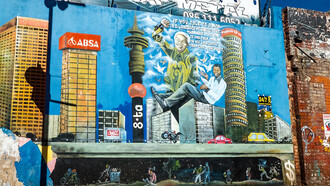There is a debate within the social sciences about whether it is easier to ascertain the truthfulness and quality of a society’s institutions under normal daily circumstances or in exceptional situations, during times of crisis. One can probably learn from both types of situation, but each of them is certain to bring to the fore and teach us different things. What is the potential knowledge to be derived from the coronavirus pandemic?
The normality of exception
The current pandemic is not your typical crisis scenario, in sharp contrast to a normal situation. Since the 1980s – as neoliberalism established itself as the leading version of capitalism, which in its turn became increasingly dependent on the logic of the financial sector – the world has been living in a permanent state of crisis. This is an anomalous situation for two kinds of reasons. On the one hand, the notion of a permanent crisis is an oxymoron, given that etymologically a crisis is, by definition, both exceptional and temporary in nature, as well as an opportunity to overcome a predicament and move on to a better state of affairs. On the other hand, if a crisis is temporary, it must be explained by the factors that gave rise to it, but when it turns into something permanent, it becomes the cause that explains everything else. Thus, for example, the unending financial crisis is used to explain the cuts to social policies (health, education, social welfare) or wage degradation. With that, it has successfully staved off questions about the real causes of the crisis. The purpose of permanent crisis is to keep it from being overcome. But what is the purpose of such a purpose? It is essentially twofold: to legitimize the scandalous concentration of wealth, and to avoid effective measures aimed at preventing imminent ecological catastrophe. That is the way we have lived these past forty years. Viewed in this light, the pandemic is only the worsening of a crisis situation that has been afflicting the world population. Hence its specific perilousness. A mere ten or twenty years ago, the public health services of many countries were better prepared to fight the pandemic than they are now.
The elasticity of the social
In every historical era, the dominant modes of living (work, consumption, leisure, coexistence) and of hastening or holding off death are relatively rigid and appear to stem from rules etched in the stone of human nature. These modes keep changing little by little, so the changes tend to go unnoticed. The outbreak of a pandemic is incompatible with this type of change. It calls for dramatic changes, which become possible from one moment to the next, as if that possibility had been there all along. It is suddenly possible for you to stay at home and again find the time to read a book or spend more time with your children, to consume less, forgo the addiction of whiling away the time in shopping centers, eyeing what is for sale while forgetting all the things that you desire but cannot be bought. The conservative notion that there is no alternative to the mode of life forced on us by hypercapitalism collapses. It becomes evident that the reason there are no alternatives is because the democratic political system has been shaped into abandoning any consideration of alternatives. Having been expelled from the political system, the alternatives are increasingly bound to enter the lives of citizens through the back door of pandemic crises, environmental disasters and financial collapses. To put it differently, the alternatives are bound to come back in the worst possible manner.
The frailty of the human
The apparent rigidity of social solutions generates an odd sense of security among the classes benefiting the most from them. There remains always, of course, some measure of insecurity, but there are means and resources available to allay it, whether in the form of healthcare, insurance policies, services provided by private security companies, psychotherapy, or gyms. This sense of security gets mixed with feelings of arrogance and even condemnation toward all those who feel victimized by these very social solutions. The viral outbreak interrupts the common sense and causes the sense of security to melt overnight. We know that the pandemic is not blind and that it has its preferred targets. With it, however, a common awareness of planetary, democratic-like communion is somehow being created. That is actually the etymological root of the word “pandemic”: all people. The tragedy is that, in the present case, the best way to show solidarity with one another is to isolate yourself and refrain from even touching others. It is certainly an odd communion of fortunes. Will others be possible?
The ends do not justify the means
The negative impact of the economic slowdown is quite obvious, especially as far as the largest and most dynamic country in the world is concerned. On the other hand, however, there are also some positive consequences. Such is the case, for example, with the decrease in air pollution. An air quality expert from the U.S. space agency (NASA) said that never in the past has such a dramatic drop in pollution been observed over such a vast area. Does that mean that at the beginning of the 21st century the only way to avoid the approaching ecological catastrophe is by massively destroying human life? Have we lost our cautionary imagination and the political capacity to put it into practice?
We also know that in order to effectively control the pandemic, China has resorted to highly strict methods of repression and surveillance. It is becoming increasingly evident that these measures have proved effective. But whatever other merits China may have, it cannot be said to be a democratic country. It is extremely doubtful that such measures could be implemented, or implemented with the same level of effectiveness, in a democratic country. Does that mean that democracy lacks the political capacity to respond to emergencies? On the contrary, according to The Economist, which earlier this year showed that epidemics tend to be less lethal in democratic countries, because of the free flow of information. But since democracies are more and more vulnerable to fake news, we will have to imagine democratic solutions based on participatory democracy practiced at the level of neighborhoods and communities and on civic education geared toward solidarity and cooperation rather than toward entrepreneurship and competitiveness at all costs.
The war of which peace is made
The way in which the pandemic narrative was first framed by the Western media made it clear that there was a deliberate attempt to demonize China. The poor hygienic conditions obtaining in China’s live-animal markets and the strange eating habits of the Chinese people (implying primitivism ) were supposed to be the cause of the disease. Subliminally, people across the world were thus being warned against the danger that China, now the world’s second economy, may come to rule the world. If China had proved incapable of preventing such harm to global health and, what is more, of effectively addressing it, how could one possibly trust the technology of the future as proposed by China? But did the virus actually originate in China? The fact is that, according to the World Health Organization, the origin of the virus is still to be determined. It is, therefore, irresponsible for U.S. officials to speak of the “foreign virus” or the “Chinese coronavirus”, if nothing else because only countries with good public health systems (the U.S. not among them) are in a position to provide free testing and accurately determine which types of influenza have occurred in recent months. What we do know for sure is that, quite apart from the coronavirus, a trade war is being waged between China and the U.S., an all-out war which, by all indications, must end with a winner and a loser. From the U.S. perspective, it is urgent to neutralize China’s leadership in four different areas: cell phone manufacturing, fifth generation telecommunications (artificial intelligence), electric cars, and renewable energy.
The sociology of absences
A pandemic of this magnitude is ample cause for a worldwide commotion. Although a modicum of drama is justified, it is well always to heed the shadows that visibility creates. Thus, for example, MSF (“Doctors Without Borders”) is currently drawing public attention to the fact that the many thousands of refugees and immigrants detained in Greek internment camps are extremely vulnerable to the virus. In one of these camps (Moria) there is one water tap for 1300 people and a lack of soap. The internees are forced to live cramped on top of each other. Families of five and six are sleeping in a space less than three square meters. This, too, is Europe – invisible Europe.















